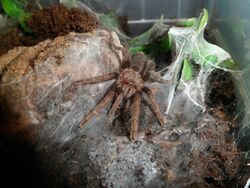Biology:Haplocosmia
From HandWiki
Short description: Genus of spiders
| Haplocosmia | |
|---|---|

| |
| Haplocosmia nepalensis | |
| Scientific classification | |
| Domain: | Eukaryota |
| Kingdom: | Animalia |
| Phylum: | Arthropoda |
| Subphylum: | Chelicerata |
| Class: | Arachnida |
| Order: | Araneae |
| Infraorder: | Mygalomorphae |
| Family: | Theraphosidae |
| Genus: | Haplocosmia Schmidt & von Wirth, 1996[1] |
| Type species | |
| H. nepalensis Schmidt & von Wirth, 1996
| |
| Species | |
| |
Haplocosmia is a genus of Asian tarantulas that was first described by Günter E. W. Schmidt & V. von Wirth in 1996.[2] (As of March 2020) it contains three species, found in Nepal, Himalayas and Tibet: H. himalayana, H. nepalensis and H. sherwoodae .[1]
Diagnosis
They can be distinguished by the spermathecae, which is in one piece, which thorn like hairs on the chelicarea and the scopula on tarsi 1 through 4. The scopula on tarsus 4 is divided by hairs.[3]
Behaviour and ecology
They burrow in silk-linen burrows in the ground, and are found at elevations of 1000-2000m.[4]
See also
References
- ↑ 1.0 1.1 Gen. Haplocosmia Schmidt & von Wirth, 1996. Natural History Museum Bern. 2020. doi:10.24436/2. http://www.wsc.nmbe.ch/genus/3362. Retrieved 2020-04-17.
- ↑ Schmidt, G.; Wirth, V. von (1996). "Haplocosmia nepalensis gen. et sp. n., die erste Vogelspinne aus Nepal (Araneida: Theraphosidae: Selenocosmiinae)". Arthropoda 4: 12–15.
- ↑ Lin, Ye-Jie; Yan, Xunyou; Li, Shuqiang (2022-03-23). "A new species of the tarantula genus Haplocosmia (Araneae, Theraphosidae) from Tibet, China" (in en). Biodiversity Data Journal 10: e82682. doi:10.3897/BDJ.10.e82682. ISSN 1314-2828. PMID 35437411.
- ↑ Mondal, Ayan & Chanda, Debomay & Vartak, Atul & Kulkarni, Siddharth. (2020). A Field Guide to the Spider Genera of India.
Wikidata ☰ Q2062603 entry
 |

